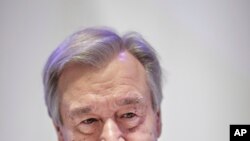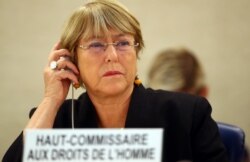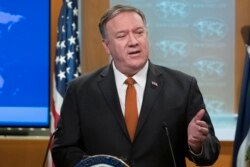The U.N. Secretary-General said Tuesday that there is still "an enormous gap" between what the Universal Declaration of Human Rights calls for and the situation in countries around the world.
"Human rights violations, misogyny and exclusion are widespread and systematic. Inequality is growing, and hate speech is poisoning public debate," António Guterres told a U.N. gathering on International Human Rights Day. "The climate crisis, urbanization and endless conflict are denying millions of people their fundamental rights and freedoms."
This year's human rights day theme is "youth standing up for human rights," and Guterres pointed to the wave of global protests, noting that the youth are in the lead seeking a better future.
"Everywhere, they are marching against corruption, repression and inequality, and for human rights and human dignity. Young people are on the front lines of action against the climate emergency, which poses a serious threat to human rights and to human life," he said.
"We must all rise up peacefully to achieve a world of rights, dignity and opportunity for all. With strength and determination, let us stand up for human rights," U.N. High Commissioner for Human Rights Michelle Bachelet said in a video message to the gathering.
Guterres criticized countries that crack down on human rights defenders. He said some who have worked with the United Nations have reported acts of retaliation and even detention for their work.
"This reflects a broader trend that is completely unacceptable," he said. "The work of human rights defenders, young and old, is essential to all our efforts for peace and for inclusive and sustainable development. They must be protected and supported."
Tuesday's event included youth from several countries speaking about what they are doing to advance human rights in their communities. One activist — a young indigenous woman from Guatemala — was not present. Organizers said it was because she was denied a visa by the United States, which is the host country of the United Nations. In response to an inquiry from VOA, a U.S. State Department official said visa records are confidential, and individual cases are not discussed.
In Washington, Secretary of State Mike Pompeo issued a human rights day statement calling out China, Iran, Syria and Venezuela for human rights abuses. He did not name North Korea, which is one of the world's worst rights abusers.
The United States, which is the president of the U.N. Security Council this month, also abandoned plans to hold a meeting Tuesday on the human rights situation in North Korea in the council. Instead, the focus of the meeting has been shifted at Washington's request to ballistic missile launches and will be held Wednesday.
Washington did announce new sanctions on several rights abusers, including military leaders from Myanmar who were involved in the massacre of Rohingya Muslim villagers, and five individuals implicated in the murder of two human rights defenders in South Sudan two years ago.






